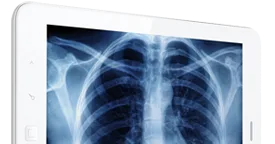AI in
Healthcare
Download the Solution Brief
The global AI in Healthcare Market
will exceed $64 billion by 20271

Applications of AI in Healthcare
Challenges
Why is Gaudi a good fit for Healthcare Use Cases?
Deep neural network-based medical image analysis or genomics includes a large amount of processing that can be paralleled and thus accelerated. Healthcare use cases benefit specifically from accelerators that can handle data parallelism when the training dataset is huge and model parallelism when the models are large.
The two primary considerations that come into play when employing AI processing are time- and cost-to-train. Habana’s Gaudi Training Processors are expressly designed—in both hardware and software—to deliver high-efficiency cost- and time-to-train, making AI training more accessible to more organizations and for more applications.
First-generation Gaudi delivers up to 40% better price-performance than comparable GPU-based solutions—for both the EC2 DL2 instance and on-premise systems. Training with Gaudi clusters is available both in the cloud with AWS EC2 DL1 instances consisting of 8 Gaudis and on-premises with the Supermicro X12 Gaudi Training Server also consisting of 8 Gaudis. In addition, Gaudi 2, which launched in May 2022, offers substantial performance advances that enable significantly faster training of models while preserving cost-efficiency. Gaudi 2 systems will be available from Supermicro in 2H 2022 for on-premises implementation.
Customer
Testimonials
Leidos built a rich portfolio of healthcare applications for various federal agencies. These include NLP applications for regulatory review, subject matter queries, fraud, waste and abuse detection, and medical literature search and correlation for various government health agencies. They successfully demonstrated 60% cost savings with using DL1 vs. GPU instances training deep learning solution to facilitate medical benefit application processing in Veterans Health agency on DL1 Habana Gaudi instances.
Given Leidos and its customers’ need for quick, easy, and cost-effective training for deep learning models, we are excited to have begun this journey with Intel and AWS to use Amazon EC2 DL1 instances based on Habana Gaudi AI processors
Chetan Paul
CTO Health and Human Services
Leidos

